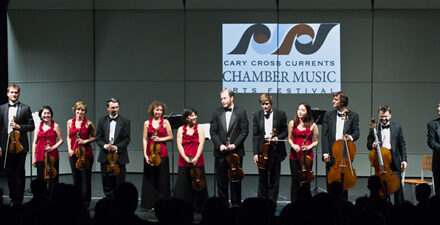Jazz is at the heart of Durham’s culture, and there was no better way to celebrate this than with a eight-day performance series, “In the Jazz Tradition,” featuring a number of acclaimed women jazz vocalists from across the country. Sponsored by Duke Performances and held at Durham Fruit & Produce Company (also known as “The Fruit”), these concerts were intertwined, as music often is, with themes of current events, such as race and gender equality. This sense of awareness and urgency was present with Jazzmeia Horn, the explosive, Texas-born vocalist who wove self-affirmation and mantras into her performance. Horn has been nominated for a Grammy award in the jazz category, for her latest recording, A Social Call. All at once, her performance was mesmerizing, bold, and uplifting.
Horn’s vocals were joined by her fabulous band members: pianist Victor Gould, bassist Barry Stephenson, and Henry Conerway on drums. The four musicians worked together seamlessly. Gould, sometimes fluid and sometimes punctuated, supported the vocals but also came to the forefront with contrasts. Conerway made every transition seamless, while Stephenson provided a stoic yet expressive bassline. From Horn’s very first note of Betty Carter’s “Please Do Something,” she established herself as an actress – not a single note was lost without expression. At times humorous, at times serious, her fiery, capricious vocal interpretations were supported with dramatic intention. Often, Horn would veer away from the melody with percussive vocal improvisations that sounded so sure as if they had been written. On top of that, her broad range of scat technique was incredible.
Much of the time, Horn’s set was continuous – running from one musical idea to another – often with the use of a mantra for connection. An articulate rendition of “Willow Weep for Me” (popularized by Billie Holliday) led to riveting, increasingly fervent phrases like “what do you put into your system.” This call for social awareness was threaded throughout her performance. The song “You’re Getting to Be a Habit with Me” hardly ever fails to make an audience smile, and Horn’s performance was no exception – her performance was so genuine that it seemed like whomever she was singing to was right there in the room.
Later in the set, Horn flexed her ballad abilities with “The Nearness of You,” which was still playful yet gentle, with fluid runs and gorgeous, understated vocals. She closed her performance with an extended, uplifting version of “Night and Day,” where she had the audience sing call-and-response style the affirmative mantra, “I love myself / when I love myself / I can love someone else.” Clearly, Horn intends to inspire, uplift, and affirm listeners with her musical career, and this performance was no different.












